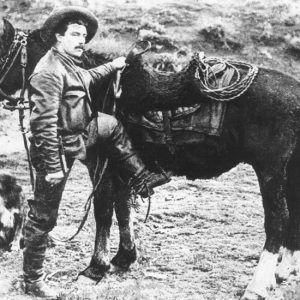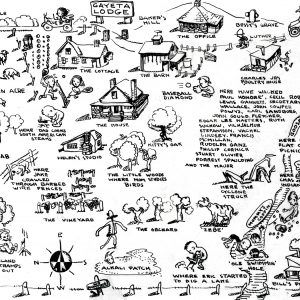calsfoundation@cals.org
Charles Joseph Finger (1867–1941)
Charles Joseph Finger was a prolific writer who settled in Fayetteville (Washington County) after an early life of travel and adventure; one of his many adventure books won the Newbery Prize for children’s literature. In addition to writing and publishing a magazine from his Fayetteville farm, Finger was employed from 1936 through 1938 as an editor of the Federal Writers’ Project (FWP) guidebook, Arkansas: A Guide to the State.
Charles Joseph Frederick Finger was born on December 25, 1867, in Willesden, England. His father, also named Charles, was a German tailor recently come to England from Germany. His mother was Julia Connoly Finger, a young Irish woman. He attended several small private pre-collegiate institutions, ending with Mr. Harvey’s Grammar School. He briefly attended King’s College, London, but left without a degree. In the mid-1880s, he studied music in Frankfurt-am-Main, Germany. His parents immigrated to the United States in 1887, but Finger remained in England for some years and was associated with some of the movements to reform labor and social conditions in the country.
Between 1890 and 1895, he traveled around South America, herding sheep and cattle, panning for gold, harvesting and selling sealskins, and working among the gauchos on the Argentine plains. In 1893, he served as a guide for the Franco-Russian Ornithological Expedition to Tierra del Fuego. After returning to England, he went to New York in 1896 and later ventured through Galveston to San Angelo, Texas, where he found a job herding sheep. During this period, he wrote articles for the San Angelo Standard, the Houston Labor Journal, and the magazine Searchlight. From this time, he frequently contributed to Texas publications.
Finger became a United States citizen in 1896 and married Eleanor (Nellie) Ferguson, daughter of a sheep rancher, in 1902. From 1898 to 1904, he operated the San Angelo Music Conservatory and arranged concerts and tours. He also was a union organizer and leader, but he failed to make much money.
In his efforts to support their growing family (they eventually had five children), Finger moved to New Mexico in 1904 and found work as a boilermaker’s helper in a railroad shop in New Mexico. He soon became an auditor in the general manager’s office and, in 1905, was recruited by the Ohio River and Columbus Railway Company to serve as auditor in Ripley, Ohio. He became a director of the company and then served as the general manager of the Ohio Southeastern System, a syndicate that bought small unprofitable railroad lines and dismantled and disposed of them.
In 1916, Finger sent a manuscript of a novel, Investigations of the Doit Case, to William Marion Reedy, editor of The Mirror, a St. Louis literary magazine with a national circulation. Although Reedy rejected that and some subsequent fiction submissions, he encouraged Finger and offered him useful and specific criticism. Finally, in 1919, Reedy published three of Finger’s short stories and offered him a regular spot on his paper. During the first year, most of his work was in writing book reviews. After months of Reedy’s cajoling, Finger began to use the resources of his rich past in creating literature, in part so as to influence his own children’s education. Soon after, however, Reedy died, and the magazine ceased publication. In 1920, the Finger family settled in Fayetteville at a homestead they called Gayeta, where Finger pursued a career as a writer.
In an effort to hold together the readership of the Mirror, he started a magazine, All’s Well, or The Mirror Repolished. From 1920 through 1935, Finger wrote and published it almost single-handedly. It was a mixture of literary reminiscences and essays about northwestern Arkansas.
Finger wrote thirty-six books after he settled in Fayetteville. In 1925, his book Tales from Silver Lands won the Newbery Prize. In 1929, Courageous Companions won the Longmans Juvenile Fiction Award of $2,000. Much of what he wrote reflected his own exploits in Tierra del Fuego and Patagonia as well as in the American Southwest.
In addition to adventure tales, Finger wrote approximately thirty volumes in the Little Blue Books series. This series, edited and published by E. Haldeman-Julius in Girard, Kansas, was the first mass-market paperback enterprise in the United States. Finger’s contributions to the series ranged from Historic Crimes and Criminals to Hints on Writing Short Stories and included biographies of Theodore Roosevelt, Mahomet (Muhammad), Mark Twain, and P. T. Barnum. He published Seven Horizons, a biographical memoir, in 1930.
Finger was employed from 1936 through 1938 as an editor of the Arkansas volume of American Guide series of the Federal Writers’ Project , a New Deal effort to employ writers in compiling and disseminating material of local interest and importance. Finger disagreed with Bernie Babcock, the FWP director in Arkansas, over the precise form that the book should take, but after numerous delays, Arkansas: A Guide to the State was published in 1941 by Hastings House.
From 1933 through 1940, Finger was also a managing editor for the Bellows-Reeve Company, which published the “Journeys Through Bookland” series of books, which was sold door to door. He wrote a series of pamphlets, called “Stopovers,” containing pointers for the sales people on the psychology of selling. He also edited Answers, a monthly journal devoted to answering readers’ queries about children’s literature.
Finger entertained literary and artistic guests at his home and was a mentor to younger literary and intellectual aspirants from Fayetteville and the University of Arkansas (UA) in Fayetteville, which awarded him an honorary LL. D. in 1932.
Finger died of influenza and a heart attack on January 7, 1941, at Gayeta and was buried on the grounds; after the death of his wife in 1965, his remains were disinterred and buried with hers in the cemetery at Farmington (Washington County). In 1944, the Maritime Commission named freighter USS Charles J. Finger in his memory. On July 5, 1983, the city of Fayetteville established a park named in his honor not far from Gayeta.
For additional information:
Charles J. Finger Papers. Special Collections. University of Arkansas Libraries, Fayetteville, Arkansas.
Finger, Charles J. Seven Horizons. Garden City, NY: Doubleday, Doran & Company, 1930.
McIlheny, Wendy. “Charles J. Finger: The Long Preparation 1867–1920.” MA thesis, University of Arkansas at Fayetteville, 1978.
Shores, Elizabeth Findley. Shared Secrets: The Queer World of Newberry Medalist Charles J. Finger. Fayetteville: University of Arkansas Press, 2021.
Simpson, Ethel C. “C. J. Finger in Fayetteville: The Last Horizon.” Arkansas Historical Quarterly 72 (Autumn 2013): 222–241.
Smith, James Fletcher. “Charles J. Finger in the Heart of Romance.” Boston Evening Transcript. October 26, 1929.
Spain, Mary Ann. “The Squire of Gayetta Remembered.” Flashback 31 (February 1981): 1–9.
Ethel C. Simpson
University of Arkansas, Fayetteville


 Charles Finger
Charles Finger  Gayeta Homestead
Gayeta Homestead 



Although not mentioned here, it appears Finger must have spent time in Australia, as his 1924 book Bushrangers, published by Robert M. McBride in New York, is about Australian outlaws. It is hard to imagine him writing such a book without Australian experience.